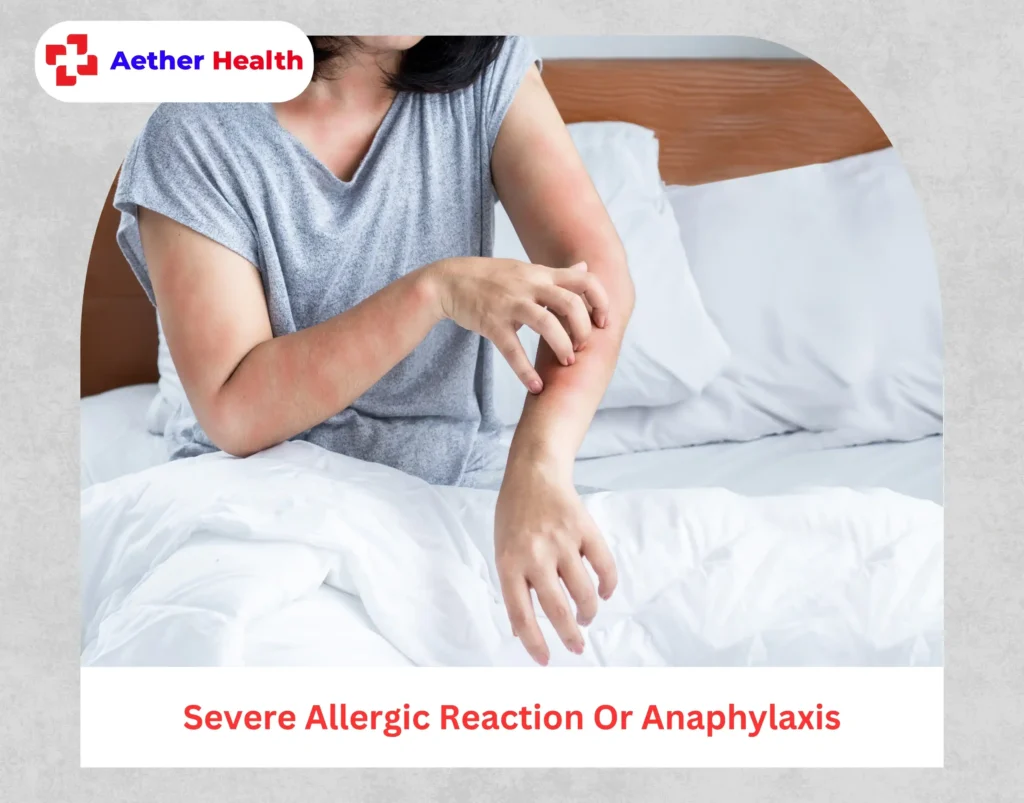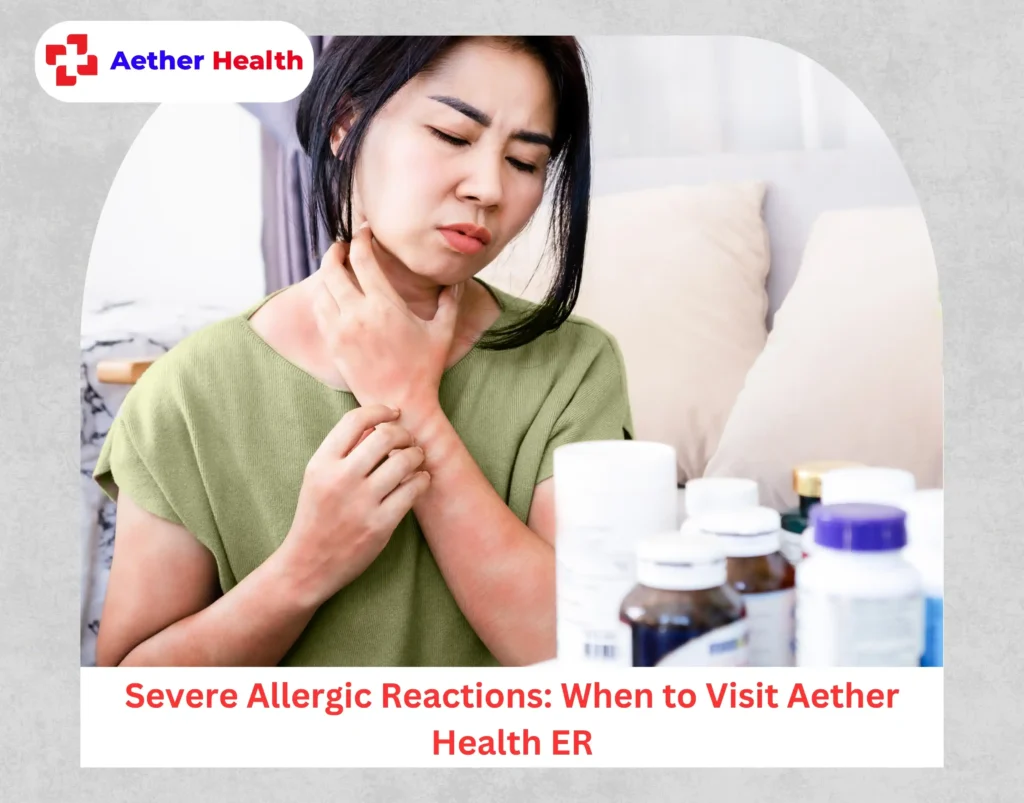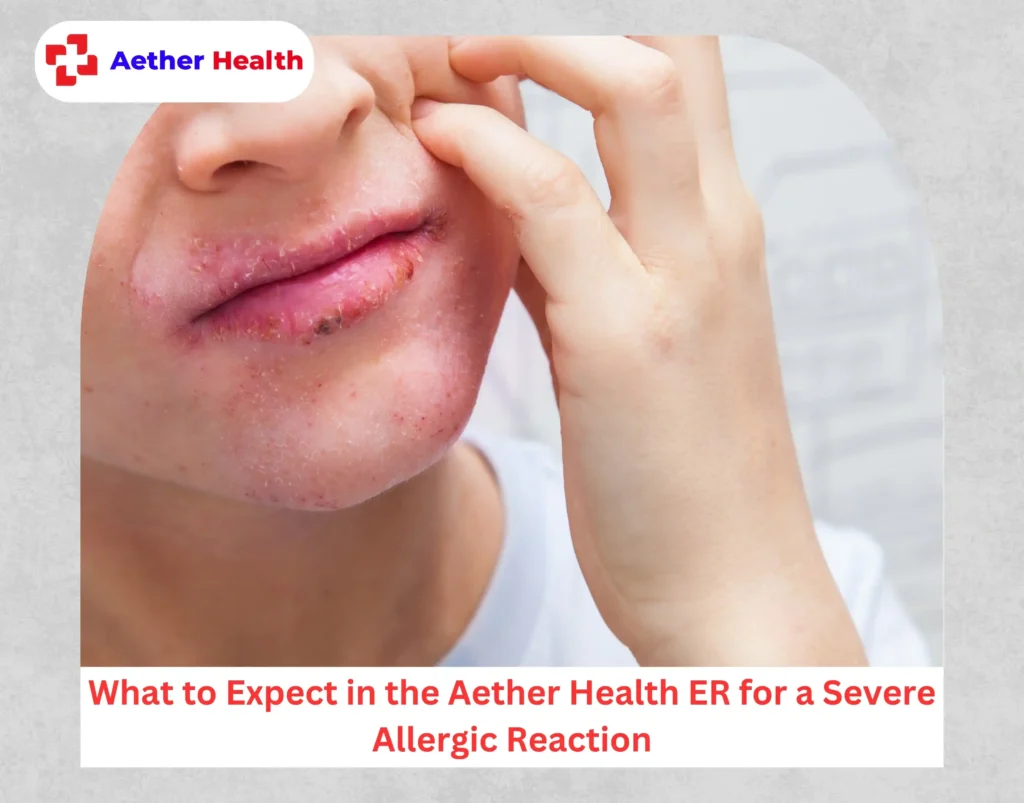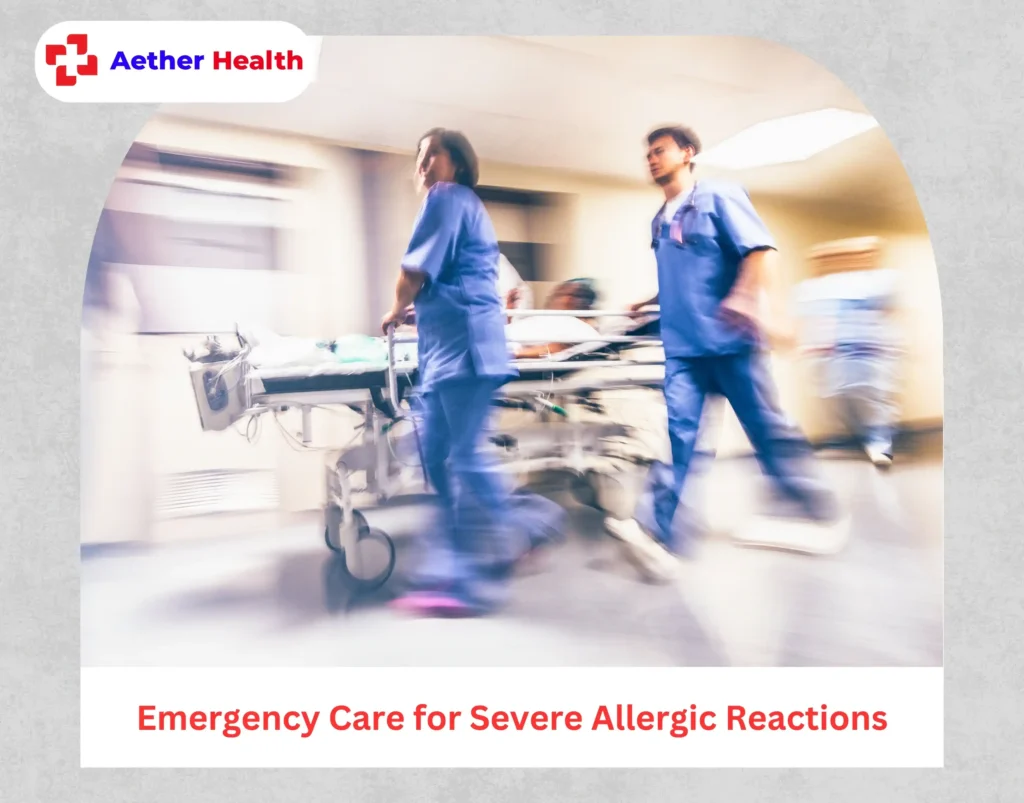Most people recognize mild allergies; the sneezing from cat dander, itching after yard work, or having a mild rash after trying a new lotion. These are uncomfortable, but not emergencies.
Then there’s anaphylaxis. This severe allergic reaction hits fast and hard: breathing troubles, swollen lips, tight chest, or plummeting blood pressure. About 1 in 50 Americans will experience anaphylaxis, though experts suspect many cases go unreported.1 It can be life-threatening if not treated soon when symptoms begin.
You can stay ahead of it by recognizing the signs and when to go to the ER for allergic reaction. Let’s break down how to tell when an allergic reaction becomes an emergency and what happens when you show up at the ER for allergy care.
Severe Allergic Reaction Or Anaphylaxis

Anaphylaxis is a severe, life-threatening allergic reaction that happens very quickly. Sometimes within minutes of exposure to something you’re allergic to. Common triggers include:
- Foods: Peanuts, tree nuts, shellfish, milk, eggs, wheat, and soy.
- Medications: Antibiotics (e.g., penicillin), NSAIDs, and aspirin.
- Insect stings: Bees, wasps, hornets, yellow jackets, and fire ants.
More people have died from fire ant allergies in Texas than in any other state in the U.S.2
- Latex: Found in gloves, balloons, and some medical devices.
Recognizing the Signs of Anaphylaxis
In a severe allergic reaction or anaphylaxis, your body overreacts and floods itself with chemicals (histamine). The reaction often starts mild but then becomes severe. Here are the signs:
Mild Signs (First clues something’s wrong)
- Itchy skin or hives (especially around the face or chest)
- Flushed or warm skin
- Mild swelling (like lips, eyelids, or hands)
- Runny nose or sneezing
- Tingly or itchy mouth or throat
- Mild nausea or stomach discomfort
Moderate Signs (your body is reacting more aggressively)
- Swelling in the throat, lips, or tongue
- Hoarseness or trouble speaking.
- Coughing, wheezing, or shortness of breath
- Feeling faint, dizzy, or lightheaded
- Vomiting or diarrhea
- Stomach cramps
- Rapid heartbeat or a sense of panic
Severe Signs (Life-threatening condition)
- Trouble Breathing
- Severe throat swelling changes your voice or makes swallowing impossible.
- Dizziness or fainting (because of sudden drop in blood pressure)
- Blue or gray lips or fingernails (a sign of low oxygen)
- Collapse or loss of consciousness
- Loss of Consciousness
- Seizures (in rare cases)
It’s a medical emergency—you need immediate anaphylaxis care.
When to Go to ER for Allergic Reaction
After recognizing allergic reaction symptoms, knowing when to seek emergency care can save your life. Don’t wait if you experience any moderate to severe signs – anaphylaxis can escalate from uncomfortable to life-threatening within minutes.
Seek immediate emergency care when you have:
- Any breathing difficulty, wheezing, or throat tightness
- Swelling of face, lips, tongue, or throat that affects speech or swallowing
- Rapid heartbeat with dizziness or fainting
- Widespread hives covering large body areas
- Severe nausea, vomiting, or stomach cramps
- Any combination of symptoms affecting multiple body systems
Why emergency care is critical: Your immune system floods your body with chemicals that make blood vessels leaky. Fluid escapes into tissues, causing dangerous throat swelling while dropping blood pressure. Your heart and brain struggle to get oxygen, leading to anaphylactic shock.
This process can happen within 5-30 minutes of allergen exposure. Even if you’ve used an EpiPen, you must go to the ER. Epinephrine provides temporary relief but wears off, and symptoms often return more severely.
Note: If you notice signs of a severe allergic reaction, don’t drive yourself to the emergency room. Call 911 or have someone else take you.
What to Expect in the Aether Health ER for a Severe Allergic Reaction
Here’s how the Aether Health ER team handles a severe allergic reaction:
Immediate Epinephrine Injection
Epinephrine, also known as adrenaline, is a hormone that can quickly reverse the deadly symptoms of anaphylaxis. Doctors recommend patients with severe allergies carry their auto epinephrine injection (a pen-like injector that holds a single dose of adrenaline).
Even if you’ve already taken a dose of epinephrine at home, you must go to the ER for further treatment. Because the symptoms can return once the medicine wears off. If the reaction comes back, you need to be in a place that can handle it. And Aether Health ER does everything to stop your body from going into shock.
Airway and Breathing Support
If you’re struggling to breathe, we may:
- Give oxygen through a mask
- Use nebulized medications (like albuterol) to relax your airway muscles.
- In extreme cases, insert a breathing tube if the throat is too swollen.
IV Medications and Fluids
You’ll usually be hooked up to an IV to get:
- Fluids, which help bring your blood pressure back up when your body is dropping it
- Steroids (like prednisone) to calm inflammation.
- Antihistamines block histamine and ease symptoms like hives and itching.
Monitoring for Biphasic Reactions
Biphasic anaphylaxis is when a person has a second wave of severe allergic reaction. It can happen anywhere from 1 to 12 hours or sometimes after 72 hours. That’s why even after you start feeling better, Aether Health ER keeps you under observation to make sure that if a biphasic reaction happens, we are right there to treat it fast.
Aftercare
Before you’re discharged, the Aether Health ER team will usually:
- Prescribe an epinephrine auto-injector (like EpiPen) if you don’t have one
- Go over allergy safety tips and tell you to follow up with an allergist
- Provide clear instructions on how to avoid future exposure and what to do in case of another emergency
In short, the Aether Health ER controls a severe allergic reaction by quickly stopping the body’s overreaction, protecting your breathing and heart, and making sure it doesn’t come back.
Emergency Care for Severe Allergic Reactions
Living in Texas means dealing with tons of allergens—oak and cedar pollen, mold from humidity, fire ants, and bees. Always carry your EpiPen if prescribed. But remember it doesn’t cancel the allergic reaction, it gives you time to get to emergency care.
Aether Health ER has tools and medications far beyond what an EpiPen can do. We won’t leave you alone until your health is completely safe. So if you doubt the severe allergic signs, rush to the Aether Health ER. It’s better to err on the side of caution.
FAQs
1. How long do you stay in the ER after an allergic reaction?
Mild cases may need monitoring for a few hours. But if it’s a severe reaction you’ll likely be watched longer, sometimes overnight, to make sure symptoms don’t come back.
2. How long does it take for an allergic reaction to clear up?
A mild reaction like hives or sneezing may clear up in a few hours or a day. More severe reactions, especially anaphylaxis, can take longer, sometimes a day or two. Depends on how your body responds and if there’s a second wave of symptoms (called a biphasic reaction).
3. What if I have an allergic reaction but don’t know why?
Not knowing your trigger leaves you wide open for it to happen again, possibly worse. So, if you break out in hives or swell up and you have no clue what caused it, you need to get checked out ASAP. After you’re stable, an allergist can run tests to track down the trigger. Knowing your allergens means you can make smart choices about your health. You’ll know which foods to avoid, what medications to flag, or which environments to steer clear of.
4. How can I stay safe if I have a severe allergy?
Always carry your epinephrine auto-injector. Make sure people around you know about your allergy and what to do if things go south. Be extra cautious with food by reading labels and asking questions when you’re out. Wearing a medical alert bracelet helps first responders when you can’t speak. And don’t forget to schedule regular follow-ups with your allergist to keep your care plan up to date.
5. Can an allergic reaction cause a fever?
No, allergies don’t typically cause a fever. A fever means your body’s fighting an infection, like a cold or the flu. That said, allergies can sometimes lead to secondary infections, like sinusitis, which can cause a fever. If you’re dealing with both allergy symptoms and a fever, it’s worth getting checked out.





